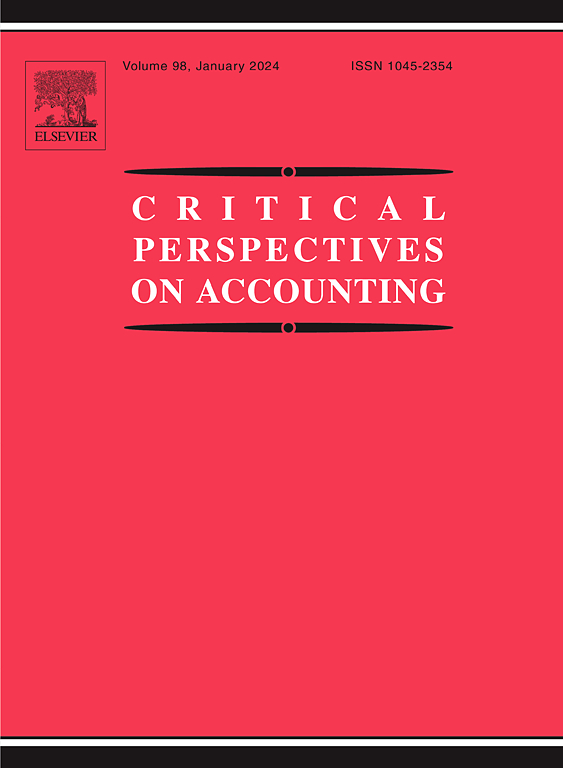控制原型的出现:瑞典公共部门基于信任的控制的理论化
IF 5.7
2区 管理学
Q1 BUSINESS, FINANCE
引用次数: 0
摘要
这项研究有助于我们理解新的控制原型是如何在制度领域中出现的。我们概念化并探讨了竞争性控制原型如何被理论化以促进原型的改变。我们的实证案例说明了政府委员会如何在公共部门领域发展和推广基于信任的控制(TBC),作为新公共管理(NPM)导向控制的替代方案。新出现的控制原型通过委员会(“理论家”)的积极工作,在六个理论方面获得了动力:自我认识,均质化,解释,抽象,重新聚焦和角色重塑。通过分析理论化在创建新兴控制原型中的作用,我们的研究有助于研究理论化在整个领域的会计和控制变化的出现。我们的案例和概念化也有助于批判性地审视NPM批评者,以及委员会的理论化如何在长期内推动或阻碍该领域结束NPM时代。本文章由计算机程序翻译,如有差异,请以英文原文为准。
The emergence of control archetypes: Theorization of trust-based control in the Swedish public sector
This study contributes to our understanding of how new control archetypes emerge in institutional fields. We conceptualize and explore how a competing control archetype is theorized to promote archetype change. Our empirical case illustrates how a governmental committee developed and promoted Trust-Based Control (TBC) as an alternative to New Public Management (NPM)-oriented control in the public sector field. The emerging new control archetype gained momentum through the active work of the committee (the “theorists”) in six lines of theorization: Self-recognizing, Homogenizing, Explicating, Abstracting, Refocusing, and Role-remodeling. By analyzing the role of theorization in the creation of an emerging control archetype, our study contributes to research on theorization for the emergence of field-wide accounting and control variation. Our case and conceptualization also contribute to a critical examination of NPM critics and how the committee’s theorization may enable or hinder ending the NPM era in the field in the longer term.
求助全文
通过发布文献求助,成功后即可免费获取论文全文。
去求助
来源期刊

Critical Perspectives on Accounting
BUSINESS, FINANCE-
CiteScore
9.40
自引率
7.80%
发文量
91
期刊介绍:
Critical Perspectives on Accounting aims to provide a forum for the growing number of accounting researchers and practitioners who realize that conventional theory and practice is ill-suited to the challenges of the modern environment, and that accounting practices and corporate behavior are inextricably connected with many allocative, distributive, social, and ecological problems of our era. From such concerns, a new literature is emerging that seeks to reformulate corporate, social, and political activity, and the theoretical and practical means by which we apprehend and affect that activity. Research Areas Include: • Studies involving the political economy of accounting, critical accounting, radical accounting, and accounting''s implication in the exercise of power • Financial accounting''s role in the processes of international capital formation, including its impact on stock market stability and international banking activities • Management accounting''s role in organizing the labor process • The relationship between accounting and the state in various social formations • Studies of accounting''s historical role, as a means of "remembering" the subject''s social and conflictual character • The role of accounting in establishing "real" democracy at work and other domains of life • Accounting''s adjudicative function in international exchanges, such as that of the Third World debt • Antagonisms between the social and private character of accounting, such as conflicts of interest in the audit process • The identification of new constituencies for radical and critical accounting information • Accounting''s involvement in gender and class conflicts in the workplace • The interplay between accounting, social conflict, industrialization, bureaucracy, and technocracy • Reappraisals of the role of accounting as a science and technology • Critical reviews of "useful" scientific knowledge about organizations
 求助内容:
求助内容: 应助结果提醒方式:
应助结果提醒方式:


